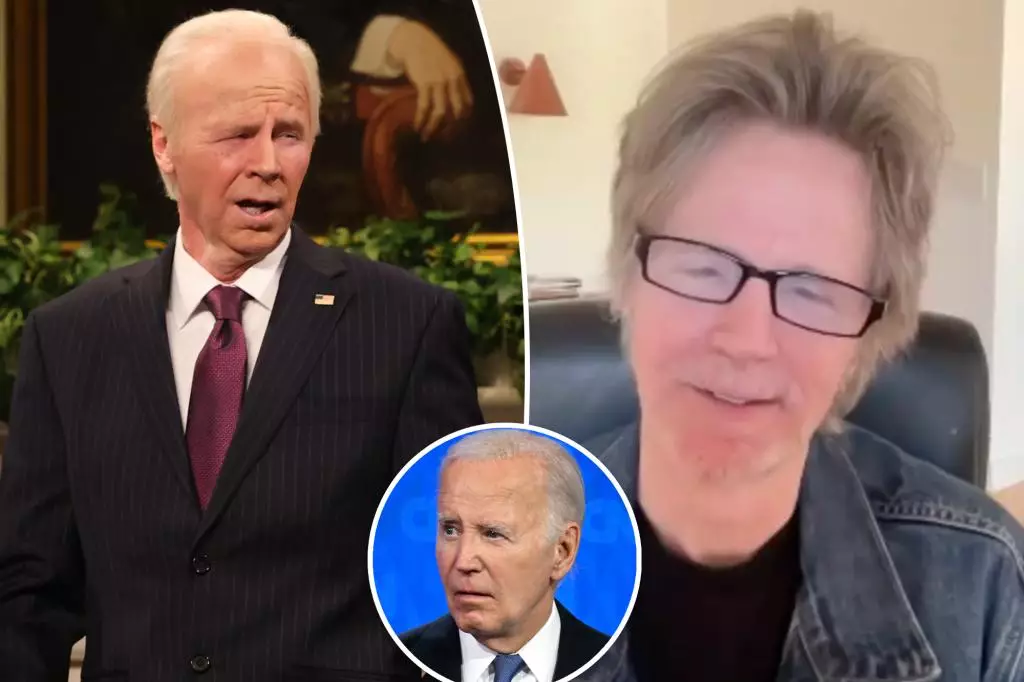Dana Carvey, a titan of sketch comedy, has made waves once again as he resumes his stints on “Saturday Night Live” (SNL) to portray none other than President Joe Biden. Few artists possess the uncanny ability to step back into the limelight after long intervals, but Carvey has always been an outlier. With his unique blend of humor and impersonation, he transports viewers back to quintessential sketches that define political satire in America. His recent engagement, spanning a mere six weeks in New York, has reignited not just nostalgia among fans but also critical discussions about the nature of comedy in politically charged times.
Carvey’s reintroduction to SNL comes at the behest of Lorne Michaels, the creative force behind the show, who reflects the show’s intricate relationship with the political zeitgeist. In a recent conversation, Carvey humorously recounted Michaels’ persuasive charm, likening it to a comfortable negotiation: “It’ll be Autumn in New York… and then afterwards you can tell us to f–k off.” This tongue-in-cheek invitation serves not just as an anecdote but as a testament to the collaborative spirit that drives SNL’s unique blend of comedy and commentary.
Presidential Impersonation: A Delicate Dance
Impersonation, particularly political impersonation, is an art form that requires not only an acute observational skill but also emotional intelligence. Carvey embodies this balance, avoiding overt mockery in favor of light-hearted portrayal. He accumulates the various quirks and mannerisms that define Biden—like a signature face-scratching act—while ensuring that the humor does not veer into sadistic territory. “I’m not trying to really make political points or put them down,” Carvey insists, emphasizing his goal is to find the levity in each character he impersonates. This perspective aligns with a common dilemma faced by comedians today: how to navigate the fine line between comedy and cruelty.
Such careful curation of humor speaks volumes about Carvey’s intentions and methods. Comedy, in his hands, turns into a means of building bridges rather than erecting walls. It serves as a mirror reflecting the absurdities of political life, unearthing the humor hidden beneath the often tense political fabric. Knowing when to tread lightly and when to push boundaries is a trait that sets Carvey apart from his contemporaries.
Echoes of the Past: Shadows of George H.W. Bush
Carvey’s career is peppered with his iconic impersonation of George H.W. Bush, a role he embraced with both reverence and humor. His portrayal was not just a routine but a personal connection that transcended the stage. He vividly recalls a phone call from Bush after the latter lost the 1992 election, inviting him to the White House. The anecdote illustrates the unique bond formed between politicians and comedians; in many ways, Carvey was more than just an impersonator—he was chronicling history through laughter.
The gratitude displayed by Bush, who passed away in 2018, showcases a less common side of political life—a recognition of the role humor plays in easing societal burdens. Such relationships complicate the current landscape of political comedy, where caricature often supersedes humanity. Carvey’s approach invites introspection on the ethical dimensions of comedy amidst a polarizing political climate.
Innovation Beyond the Studio: A New Age of Comedy
Even as he reestablishes his comedic presence through SNL, Dana Carvey remains actively involved in the entertainment ecosystem. His co-hosting of a podcast with fellow comedian David Spade reflects a shifting cultural landscape—the need for comedians to adapt their platforms in the digital age. This venture underscores the expansion of the comedy realm beyond traditional TV formats, allowing for more intimate storytelling and shared experiences.
Through modern mediums, Carvey continues to explore the intersections of humor, politics, and social commentary, reshaping the audience’s expectations of what comedy can achieve. Carvey is not merely retreading the past; he is innovating, experimenting, and broadcasting his unique brand of insight and humor to a modern audience hungry for authenticity.
Overall, Dana Carvey’s return to the world of political satire pays homage to comedy’s powerful role in both reflecting and shaping culture. With keen insights and an open-hearted approach to humor, he remains a vital part of the tapestry that captures the humor found in the complexities of our political landscape.

